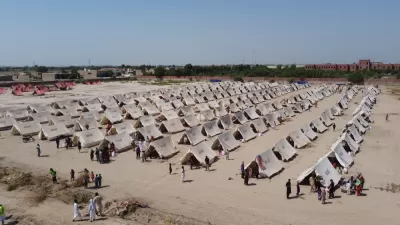The former three-term New York City mayor, already president of the C40 Cities Climate Leadership Group has been appointed to a special United Nations envoy position on cities and climate change by Secretary-General Ban Ki-moon.
"U.N. Secretary-General Ban Ki-moon on (Jan. 31) appointed former New York City Mayor Michael Bloomberg as his special envoy for cities and climate change, in a bid to build momentum ahead of a planned U.N. summit meeting in September," writes Reuters' New York correspondent, Michelle Nichols. In addition, Bloomberg is president of the board of the C40 Cities Climate Leadership Group, "an international group of mayors created in 2005 and dedicated to reducing greenhouse gas emissions."
The group held their summit in Johannesburg, South Africa from Feb. 4-6. The "event brings together C40 Mayors from around the world to advance urban solutions to global climate change through individual efforts as well as international engagement and collaboration," according to the summit's webpage.
NPR's Melissa Block engaged (offered as both audio and text) the former NYC mayor in a conversation about his new U.N. role and the most effective ways for cities to fight climate change. While he promoted many of the traffic-reduction accomplishments of his tenure as mayor of the nation's largest city, such as bike share and pedestrian plazas, his response to Block's question may have caught some by surprise:
BLOCK: If a city, if a mayor of a city, were to come to you and say what is the one thing I can do that would have the biggest impact if I want to reduce carbon emissions. What would that thing be and what would...
BLOOMBERG: The biggest thing you can do in this country is to close coal-fired power plants. They generate a third of all of the emissions. And the Sierra Club has been very successful in preventing new coal-fired plants from opening. And thanks to their efforts and the lower cost price of natural gas, a lot of old power plants have been closed. And you can see it.
The two international roles are in addition to a new venture he formed last December that seeks to improve "the lives of city-dwellers around the world," writes Beth Gardiner for the Guardian's Reslient Cities series, and also described here.
Bloomberg is redeploying many top members of his mayoral team to Bloomberg Associates, a consultancy that will, free of charge, advise cities on how best to tackle their problems, adapting and applying the approaches he used to make New York greener and more livable.
The group includes planning stars from his administration, Amanda M. Burden, Director of City Planning, and Transportation Commissioner Janette Sadik-Khan.
FULL STORY: U.N. appoints former NYC Mayor Bloomberg cities, climate change envoy

Planetizen Federal Action Tracker
A weekly monitor of how Trump’s orders and actions are impacting planners and planning in America.

Chicago’s Ghost Rails
Just beneath the surface of the modern city lie the remnants of its expansive early 20th-century streetcar system.

San Antonio and Austin are Fusing Into one Massive Megaregion
The region spanning the two central Texas cities is growing fast, posing challenges for local infrastructure and water supplies.

Since Zion's Shuttles Went Electric “The Smog is Gone”
Visitors to Zion National Park can enjoy the canyon via the nation’s first fully electric park shuttle system.

Trump Distributing DOT Safety Funds at 1/10 Rate of Biden
Funds for Safe Streets and other transportation safety and equity programs are being held up by administrative reviews and conflicts with the Trump administration’s priorities.

German Cities Subsidize Taxis for Women Amid Wave of Violence
Free or low-cost taxi rides can help women navigate cities more safely, but critics say the programs don't address the root causes of violence against women.
Urban Design for Planners 1: Software Tools
This six-course series explores essential urban design concepts using open source software and equips planners with the tools they need to participate fully in the urban design process.
Planning for Universal Design
Learn the tools for implementing Universal Design in planning regulations.
planning NEXT
Appalachian Highlands Housing Partners
Mpact (founded as Rail~Volution)
City of Camden Redevelopment Agency
City of Astoria
City of Portland
City of Laramie



























